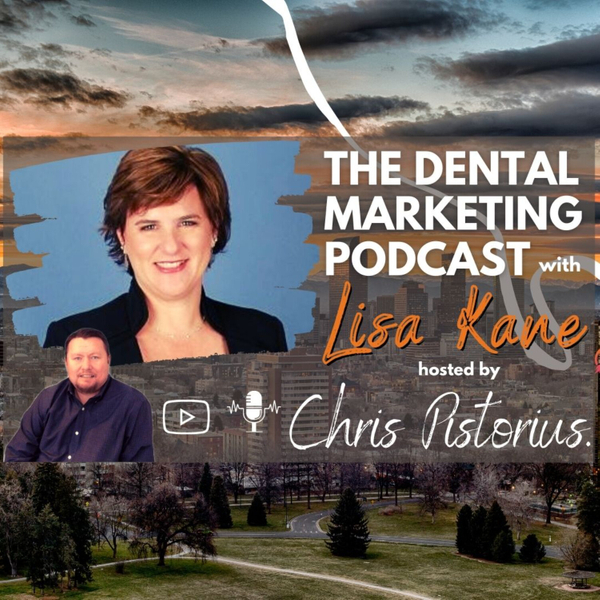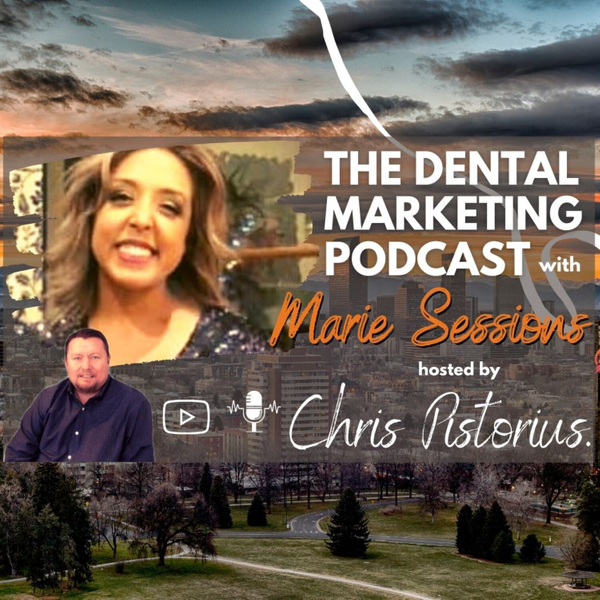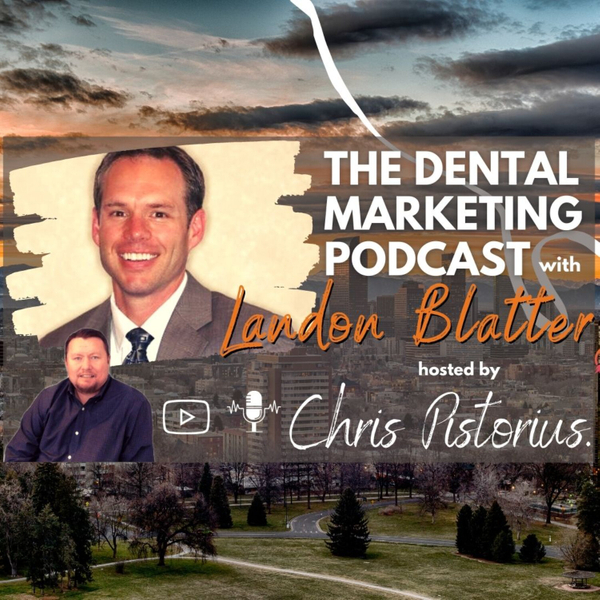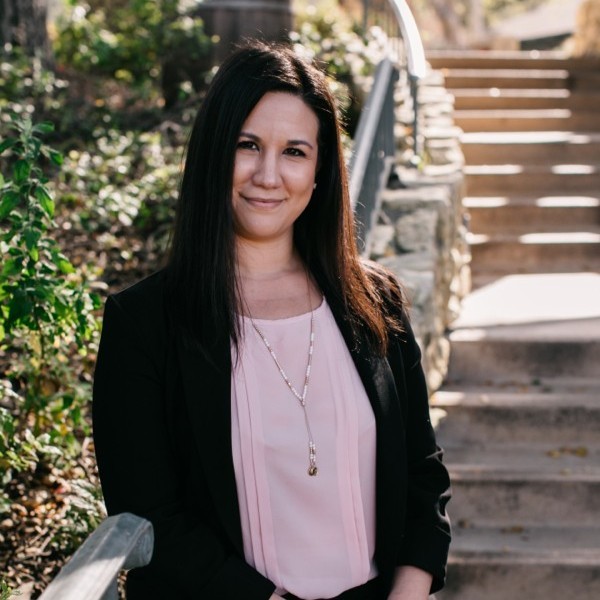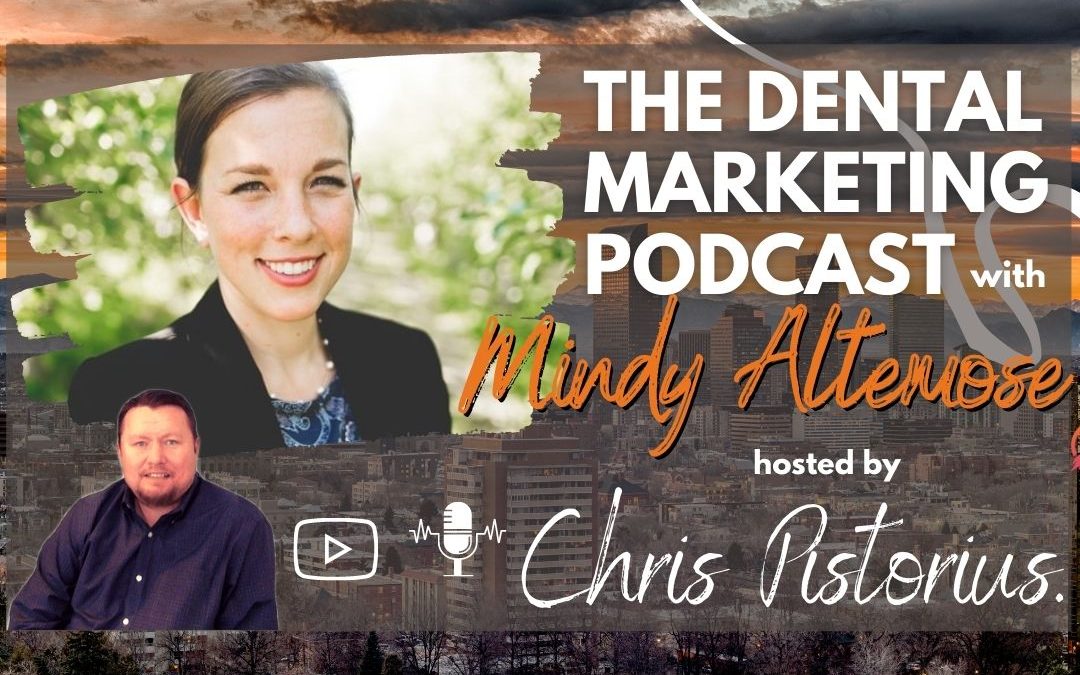
Successful Strategies For Building A Dental Practice From Scratch
To get in touch with Mindy:
Mindy Altomose
Mansfield Orthodontics
https://www.mansfieldorthodonticsma.com/
mindy.altemose.dmd@gmail.com
(508)-964-4800
View Full Transcript
Chris Pistorius (00:05):
Hey everybody. It’s Chris Pistorius, again, with the Dental and Orthodontic Marketing podcast. I’ve got a special guest for you today. We are with Mindy Altemose. She is the owner of Mansfield Orthodontics, in Mansfield, Massachusetts. Mindy, thanks so much for joining us today.
Mindy Altemose (00:25):
Thanks for having me.
Chris Pistorius (00:26):
Of course. So I’ve told you off air, I want to do more in the orthodontic space in terms of these podcasts. And I was looking, kind of getting ready for this, and I saw that you’re just barely a year into owning your own practice. Is that right?
Mindy Altemose (00:44):
Yes. Yep. We opened just before COVID, so it was just [crosstalk 00:00:49] worst timing really for us.
Chris Pistorius (00:50):
Wow, yeah. I didn’t even think about that aspect of it.
Mindy Altemose (00:53):
Yes.
Chris Pistorius (00:53):
So maybe you could tell us a little bit about just where was your mindset in college? Did you know, right out of college, you wanted to go start your own practice from scratch, or were you thinking about maybe buying an existing practice? What were you thinking then?
Mindy Altemose (01:08):
Sure, sure. Yeah, yeah. And I mentioned to you, also off air, I didn’t know I wanted to be an orthodontist in college. About halfway through, I was a science major, and I decided to become a dentist by shadowing a bunch of different health professions. And so yeah, I went to dental school. I knew, pretty early on in dental school, I would like to own. I didn’t know how that would look for me, but then luckily, I had more time because I went to residency. And it was actually in residency where I had talked to a faculty member about partnering, and so I had kind of my eyes set on that and for helping to grow his business.
Mindy Altemose (01:42):
And then when it all came to be, it just didn’t work out, and so I was thinking of what way can I go next? And I looked to acquire practices, to be very honest, and there wasn’t anything in the areas I was looking for that I thought would be a good fit for me. And once I’d exhausted all those options, I thought, well, it’s time to do a startup, I guess. And so it wasn’t my first choice to do a startup, but it was what I landed into. And I’m really happy that it worked out this way. I think it was a good fit for me.
Chris Pistorius (02:14):
Awesome. Well, I can tell you, Mindy, that if you started a practice when you started it, going through COVID, I think you can probably just about do anything else in life that you encounter. So that’s an incredible story that just brand new, from scratch, you start this orthodontic practice in one of the worst viruses known to man-
Mindy Altemose (02:37):
Sure.
Chris Pistorius (02:37):
… right in that era.
Mindy Altemose (02:38):
Sure. It’s-
Chris Pistorius (02:39):
I mean, I’m sure you probably shut down for a month or two completely?
Mindy Altemose (02:43):
Oh gosh. So yeah. So I’m in Massachusetts, so it was almost three months that we were shut down. So we weren’t even open as long as we’ve been shut down. So yeah. And also, I was new to the area. So I had just moved to Massachusetts and opened, so I never practiced here. I was in New York, upstate New York, for awhile. So it was a lot against us to get started, but honestly, I tried to take it, as I could, as a positive. We’re so little and boutique, we could keep it very low amount of numbers in our office, so I used that to help make people feel comfortable about coming to see us. And we try to still keep as least amount of people in the office as possible, so that was helpful.
Chris Pistorius (03:24):
Awesome. Well, that’s an inspiring story. So all of you young orthodontic students, or thinking about being an orthodontist, it can definitely be done, and it can be done even in an environment like we are now with COVID. So that’s an incredible story on its own. So maybe you could tell us a little bit about the practice. What do you really like doing? I know that you offer braces and Invisalign for adults and kids. Where’s your passion? Who do you like to work with the most, I guess, or what do you enjoy the most about being an orthodontist?
Mindy Altemose (03:55):
Oh, it’s the best profession in the world. So I love helping … I have two kinds of ideal clients. One is I love working with kids. So the braces age, traditionally, that kids go through is a very tough time for some kids. 12, 13, isn’t easy for everybody. So I just had an interview today for front desk, and I was talking to her about this. We try to be a positive portion of their day because things are not easy, so I love being part of a very important time in the kid’s life. And we see them often, so that allows us to have a really special relationship with them. So I love working on children, but I also love the busy professionals, as well, and thinking about them in mind and how we can best be as available for them and honor their time.
Mindy Altemose (04:47):
So between both of my ideal customers, it being a family with two and a half kids or whatever they say, and then also the busy professionals, we can always get more money and more things, but we can never get back time. So one of the things that we really try to deconstruct in the orthodontic process, in general, is how do we save patients time? How do we need to be more efficient with their time and value their time more? Because as yourself, a business owner with children, time is precious thing, and so we think about each step of the orthodontic process and how we can give patients back a whole appointment or maybe just 10 minutes or making the process just more streamlined for them. So that way, we are more mindful of what’s most important to them. So those are my two favorite age populations. Yep.
Chris Pistorius (05:39):
Yeah, that’s awesome. So when you start a brand new practice from scratch, and this really goes for dentists or orthodontists or really anybody in business really, but when you start from scratch, and you open the patient book, and it’s absolutely empty, right? What do you think? I mean, how did you market your practice, I guess, from a blank of nothing, to where it is now? What did you do to get that started?
Mindy Altemose (06:04):
Yeah. And so I opened before COVID, so things were different then. And I wish I could do some of the things I was doing then, but basically the biggest thing for me was to be as present in the community as possible. So we went, before we were open, to different health fairs. We went to an agricultural fair. I did a lot of social media stuff because that just isn’t and still isn’t being done in my area, especially for orthodontist. I tried to connect with other local small businesses that I felt might meet my ideal client [inaudible 00:06:39] would benefit from learning about. So I did this Facebook, which I don’t do currently, because I [inaudible 00:06:47] a few people in the office, but a spotlight on small business. So we would bring in family photographers, so you can learn about their business, see them talking to me and interacting.
Mindy Altemose (06:59):
Interior designer, organizers, people that I thought would be helpful for my ideal clients to know about, and also people I want to know about because I am sort of my ideal client because I was new to the area. I have a lot younger kids, but things that I would’ve liked to know about, being new to the area. So I did that. And even though I might’ve only had a couple followers, as they grow, and I grow, we re-share each other’s stuff. So that’s been helpful. And then getting in the community and serving the community was a big thing for me. So I joined a rotary club for my own, something that I wanted to do, but then learning about different drives and campaigns and stuff.
Mindy Altemose (07:41):
That’s one of our four core values is being a community leader, and so helping to support local community events has been huge for us because people love that. And then they’ll be like, “I really love this dog shelter they’re doing, this adoption thing. Can you help promote it?” Or whatever the case may be. And we love to do that kind of stuff. I did a Q&A thing on YouTube or something, and so that was helpful. Any way I could do for free, anything I could do for free, that was the number one thing. There were obviously a lot of paid things I did, as well, but I tried to do as much as I could for free.
Chris Pistorius (08:16):
Yeah. I think that’s a great point. And I think, honestly, it’s something that a lot of professionals miss. I do marketing, and I only work with dentists and orthodontists. And I see this. A lot of people talk to me about, “Oh, we need to do paid ads on Google or Facebook, or we need this awesome website.” And that’s all very much true.
Mindy Altemose (08:37):
Oh, 1000%.
Chris Pistorius (08:37):
But there is something to be said about just being active in your local community and just building relationships that way. That definitely, I think, has to be a core value of any marketing campaign, so much as so, we’ve created a team here that when somebody signs up with us, yeah, we do all the paid stuff and video and a bunch of cool stuff, but we also have this team call in to a local market, and they’ll try to do partnered sponsorships and partnerships with Little League teams or events or just anything to kind of get your name and your brand into that local marketplace.
Chris Pistorius (09:15):
And I think just being able to do that and people seeing your brand, over and over, on the backs of their kids uniforms, whatever it may be, I think that type of grassroot marketing should definitely be a mix. And it sounds like you’re all over that, so that’s awesome.
Mindy Altemose (09:31):
Yeah. I have found that particularly powerful and also because orthodontics is a bit different than dental dentistry, where it relies on referrals from dentists. Or not relies, but we love that partnership. And I wasn’t able to get into a lot of offices, and then COVID happened. And in orthodontics, particularly, it takes two years sometimes to see the work that I do. So of course, it takes time to build that trust, and I totally understand that. So that’s been so key for us because I couldn’t do some of the things I would have liked to done, to go in and do lunch and learns, to help and learn about these dental offices. I’ve had to rely on this grassroots.
Mindy Altemose (10:10):
And other than our location, the majority of our traffic comes from other patients, and some of the things that they have talked about us in, as well as seeing us … I did a gift card giveaway, where I promoted local salon, a local floral shop, and gave away gift cards and things like that. And people learned through us from there, and then they ended up coming in that way too. So any way you can kind of hit people in a different way than usual, where you’re providing value to them, as well, is always a positive thing.
Chris Pistorius (10:48):
Absolutely. That’s awesome. And I started my business the same way. I mean, almost 12 years ago now is when I started, and I didn’t do anything overly fancy. Basically, all I did is I put together a packet of information, and I just started walking into dental practices, saying, “Hey, I’m Chris. Here’s some information. Would love to talk to you more about it.” Got their information and left. And it’s just good to be able to walk in someplace, talk to them, and kind of build that connection straight up. So yeah, I think the grassroots stuff is definitely effective. And hopefully, once we get out of this COVID stuff, it’ll become a little bit easier to do that kind of stuff too. So
Mindy Altemose (11:30):
Yeah, [crosstalk 00:11:30] hope.
Chris Pistorius (11:31):
Yeah. And so we all know that dentistry is competitive. Orthodontic is competitive. There’s a lot of other orthodontists. What would you say is your unique selling proposition? So why should somebody come to your practice versus maybe one of the others? What do you think that is?
Mindy Altemose (11:48):
So yeah, we have a couple things that are important to us. I think how we think about patients is a little bit different than busy orthodontic practices. We have a customized approach to care, and we think about, like I mentioned, each step of the process, to really make it as streamlined, as efficient as possible, to give patients their time back. And we really respect patients’ time, and that’s very evident from the first time that you come in here.
Mindy Altemose (12:19):
Another thing that I’m sure a lot of dentists say, which is true about us too, is we are at the forefront of technology. We use a 3D digital scanner for each new patient, which is wonderful. It helps patients really understand, in a 3D perspective, what is going on with their teeth. We have the most ultra low dose radiation for our pan and ceph. We do a lot of things that are technology forward, which also helps us to save in time and money as well. And I think patients like the ability for us that we do spend a little extra time with them. It’s not a factory or a revolving door. I’ve heard that a couple of times with other patients about other local practices that might have great clinicians, but because we’re so small, still in boutique, and we want to keep that feeling, we are able to provide that additional time, and patients really love that.
Chris Pistorius (13:09):
Yeah, that’s great. And if you keep doing that, you’re going to be even more successful than you already are. So that’s good to hear that we still have some of those doctors out there that really pay attention to patients. And if it means spending a little extra time with them to make them feel better about the process, then it’s definitely worth that extra time.
Mindy Altemose (13:29):
Totally.
Chris Pistorius (13:31):
So what would you say to somebody that maybe was in your shoes, a year or two ago or three ago maybe, where they’re thinking about opening up a practice, and they’re deciding, all right, should I try to buy something? Should I go on my own? Should I just go be an associate? What tips or advice could you give somebody just starting out?
Mindy Altemose (13:53):
Yeah. So somebody who didn’t know exactly what they like to do, I think getting very clear, first of all, on what your goals are, long-term. You could make a wonderful career, being an associate, and there’s a lot less responsibility on you, on a lot of other things, as far as your time bill and as far as expertise and other things. So that’s the first is being real clear on what it is and why you’re doing it. If it’s just to make money, like I mentioned, you can make great money being an associate and have wonderful vacation and all that kind of stuff. But if you want to build a legacy, for example, or if you want to be able to eventually have a community project that’s really important to you be done, and you use your business to do that. Or you want to change a bit how things are being done, sometimes you can’t do that as associates.
Mindy Altemose (14:41):
So first, figure out what it is you want to do. And as far as owning a startup versus buying, I think it’s all what the opportunity is that presents itself to you. I think that buying is a wonderful way to do it, with a little bit less financial burden and a little bit more security upfront, from a multitude of reasons. But it needs to be a good deal, and it needs to make sense for you and the location that you want to be and all that kind of stuff. And if the startup is what is possible only, then that’s also a good decision. Just know that it is a lot of hard work, similar to acquiring, in a different way. And I would say, as far as tips, there’s a lot of great podcasts out there. I listen to Shared Practices, which is just mostly general dental and dentistry, but I could adapt it to orthodontics.
Mindy Altemose (15:30):
And so I learned a ton from that podcast. And then in my specialty, there’s a bunch of podcasts as well, like OrthoPreneurs and Elevate Orthodontics, which was helpful. And then there’s another really great … I’m sure there’s more now. That was two or three years ago. Oh, and I’m going to forget it now. Mark Costes, he’s a dentist, and he talks about the business side of dentistry. So learning more about that and seeing if that clicks with you, learning what makes sense and what fuels your fire, and then you can kind of go from there. But doing that, and then also visiting a lot of offices. That was huge for me, visiting different offices and what an office could be like because your experience or your handful of people you know, there might be so many other experiences out there that you might want to create. And so getting edified in the podcast world, that was for me. I’m sure there’s other ways. And then just physically being in more offices, maybe not even in your specialty, but just in dentistry, in general, to see what’s out there, and what’s possible.
Chris Pistorius (16:30):
Yeah. Awesome. I want to get your perspective on something. In dental school, do you think they taught you enough about business to make you prepared for starting a practice? Or do you think maybe that could be enhanced a little bit?
Mindy Altemose (16:44):
I was trying to think of something clever on the spot and didn’t come to me. No, there was no training on how to do business. Now, in my residency, I did have a course about it, so I started the wheels to turn. And then some residencies, I know, actually do an MBA, and there’s more than what I got. But no, there was no … Mm-mm (negative). Marie Forleo, she’s a speaker and has a podcast and a book. She has a saying, “Everything is figure out-able.” And I actually bought it, and it’s on my desk over there because I’ve had to learn everything from scratch, from QuickBooks to I never really used social media. I love social media now for my business, but I didn’t use it [crosstalk 00:17:21] myself learning about how it works, to the crazy stuff that you can learn around the office, like sterilization. I didn’t know the ins and outs of that, so I had to learn it. So no, there is no business preparation in school. That was all done through just figuring it out.
Chris Pistorius (17:39):
Wow, that’s crazy. You would think, at some point, they will start to incorporate some of that because there’s more and more people coming out of school that are doing what you did and going right into their own private practice. So there’s this book out there, and I’ve mentioned it before, it’s called E-Myth Revisited.
Mindy Altemose (17:56):
Yes.
Chris Pistorius (17:56):
Have you seen-
Mindy Altemose (17:57):
I’ve read that.
Chris Pistorius (17:58):
And it talks a lot about how to scale and not just necessarily for in the dental industry, but for anything. And I always recommend to my clients that are struggling on that aspect of it, read that and just try to create this machine that can run without you, right?
Mindy Altemose (18:14):
Mm-hmm (affirmative).
Chris Pistorius (18:14):
And obviously, you’re the doctor, and you have to be there, but that doesn’t necessarily mean that you can’t build a practice and have a lot of things not have to be relied upon you, you know what I mean? So-
Mindy Altemose (18:24):
Right. Absolutely.
Chris Pistorius (18:25):
Yeah. Yeah.
Mindy Altemose (18:27):
[crosstalk 00:18:27] and listen.
Chris Pistorius (18:27):
Yeah. Yeah. And so what’s in store for you over the next five years? Do you have some goals in mind, in term of business, and what would those be?
Mindy Altemose (18:37):
Yeah. I think one of them is related to that book, the E-Myth series, is that I would like to … Right now, we don’t have a lot of policies and procedures formally written down. So a big one for me is, from how to answer the phone, to how to walk a patient out, to, of course, all of our clinic procedures, be in a procedural manual. So that way, one, as we scale and grow, it’s more easy. It’s not as much hand-holding necessary, and there’s a lot more we can give to be independent to our potential new hires. So that’s a big one is to continue to grow our procedure manual and make everything automated, so that way, like you mentioned, of course, there are only things that only the doctor can do, but we need to slim that down as we grow.
Mindy Altemose (19:24):
When you’re a startup, I know how to do every single thing in this practice, which is crazy and way too much things for me to be doing all the time. But as we grow, we need to continue to disseminate some of those responsibilities and roles and then write them down formally in a way that [crosstalk 00:19:39] cohesive. So that’s a big one for me. Also growing my team. We’re a team of three right now. We need to continue to grow, in order to help as many people in the area as we can. And so that’s a big one, and then getting all of my ops in. So I have four chairs now, and I have the ability for a couple more. And so I’m continuing to obviously grow patient-wise, that way we can continue to grow and complete my clinic here. So that’d be exciting.
Chris Pistorius (20:07):
Awesome. That’s great. I want to also get your perspective, really quick, on you’re in this a little over a year now. How’s hiring and firing and all and training? I mean, I’ve talked to a lot of people in the industry, and they’re having trouble, right now, hiring people, getting good people. It seems like they’ll hire somebody, and then somebody quits. And it seems like they’re always doing this training thing, and they’re just not getting ahead. I’ve heard the perspective of, “Oh, only hire people at the front desk with experience,” and I’ve heard some people say, “I only hire people without experience.” So what’s your take on this, and being in the business for about a year now, what’s your tips and secrets to that?
Mindy Altemose (20:45):
Oh, so you guys don’t have a magical pool of wonderful employees? Oh-
Chris Pistorius (20:49):
No.
Mindy Altemose (20:50):
… that’s a [crosstalk 00:20:50]. No, so-
Chris Pistorius (20:50):
How do I get that?
Mindy Altemose (20:52):
… It is … No, I’m teasing. I say that, and honestly, I just had hired somebody who I was really excited about, and they just didn’t show up for their first day of work two weeks ago. So I say that in a funny way because it’s been quite a pain point for me. And I am a bit green in this, but something that I look for, that I know a lot of people talk about, is more about personality rather than skills. So I love to train too. Any job I worked at as an associate, I’ve always trained new assistants, and now front desk, here at this job. And so I love to train. I just don’t have all the hours of the day to do so as I’d like to.
Mindy Altemose (21:32):
So I tend to hire people with less experience, and that could be to my detriment. But what I hope to find is somebody who uses that and then grows it further. I like things to be done a certain way. Shocker, type A dentist, right? So of course, just like a startup, there’s nobody with any bad habits, which is wonderful. And so I like when people have some minor experience, a year or two, and then I can provide all the rest of the information. And so there’s no bad habits to break or things that we do kind of work ourselves around.
Chris Pistorius (22:12):
Yeah. In fact, I think it was our last interview we did with somebody, they don’t hire anybody with experience. And the reason for that is that they feel as though the people that do have experience are sometimes just so set in their ways that they’re not coachable, and it’s hard to get them to kind of do things another way. So it’s all about perspective, but I agree. I think if you can find the right personality, that’s probably the thing that you should be looking at first. And then this stuff, I mean, no offense to anybody out there listening, but this stuff isn’t rocket science. It’s teachable, and it’s learnable, and it’s-
Mindy Altemose (22:49):
100%.
Chris Pistorius (22:51):
… it’s just something you got to find somebody with a good personality that’s going to take care of your patients and are willing to learn and excel. So I think that’s all valid points. So-
Mindy Altemose (23:02):
Yeah. I think just finding what are your core things that you’re looking for in a person and then reverse engineering the questions to find scenarios where you want to see them have that core value has been helpful for me to see … Something that’s important to us is to be positive always, in all ways. And so I look for negative situations in which you can see how they’ve handled it and carried themselves. And you can only do so much in an interview, but that’s been helpful.
Chris Pistorius (23:29):
Yeah. Do you do any personality tests when you do a hiring?
Mindy Altemose (23:33):
Yeah, we do … Oh, now, it’s going to escape me. Yes. We send it. Yep. And now-
Chris Pistorius (23:38):
Is it the Kolbe?
Mindy Altemose (23:39):
I think … No, it’s not that one. Now, I’m going to-
Chris Pistorius (23:42):
But yeah, there’s a few of them out there. We use the Kolbe.
Mindy Altemose (23:44):
Yes, I’ve heard of that one though.
Chris Pistorius (23:46):
Yeah, yeah. And I got to tell you, I think it’s a good guide, but I’m not completely sold on it. I don’t know that I would ever … Say, okay, I’ll have a really cool, qualified candidate I’m excited about. Oh, the Kolbe’s test isn’t quite right, so we got throw them out. Right?
Mindy Altemose (24:02):
Yeah.
Chris Pistorius (24:03):
I think you got to use it as a guide. I just don’t know that it’s a end all, be all. You know what I mean?
Mindy Altemose (24:07):
Yeah, totally. Yeah. We want to make sure we have similar qualities that we can all work together, but right, it might be slightly off. I think some of them are important, based on where they are in the clinic, and other times it’s not nearly as important.
Chris Pistorius (24:18):
Yeah. For sure. Well, Mindy, I’ve got to thank you so much. I know how busy you are, but just the inspiration that I hear coming from you, of starting a practice during COVID, from scratch, in a new market that you’re not even from, and you’re having this crazy success. And I got to tell you, it’s just expiring for me, and I know it’s going to be very inspiring for a lot of the people that are going to watch or listen to this. So thank you so much for being on the show today.
Mindy Altemose (24:45):
Yeah, absolutely. Not a problem.
Chris Pistorius (24:48):
Awesome. Well, everybody, thanks for watching and be sure to tune in to our next episode, and we’ll talk to you all very soon. Thanks.

